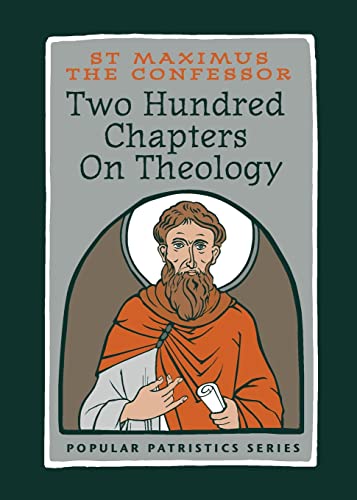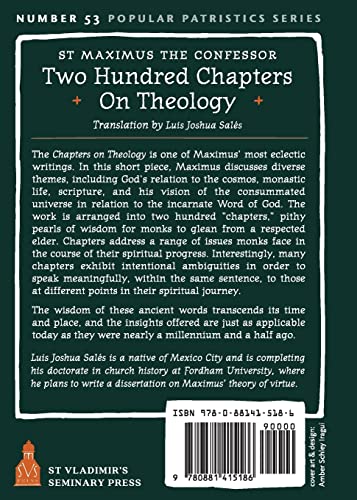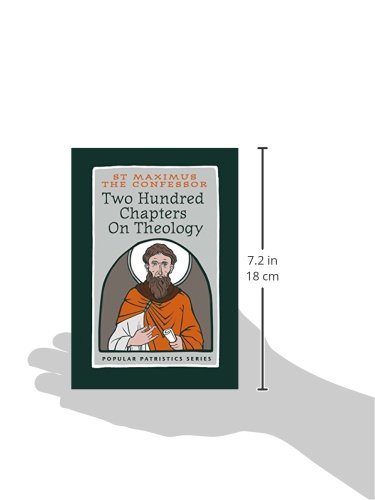Customer Services




Full description not available
A**S
A Theologically Informed Vision of Christian Spirituality
Two Hundred Chapters on Theology is actually an explanation of the spiritual life according to a typological reading of the Bible. Also building upon the Nicomachean Ethics of Aristotle, Maximus shows how the life of virtue and asceticism leads to the contemplation of the divine.It actually retains the essentials of the laws of the spiritual life laid down by the Desert Fathers—not surprising since Maximus was geographically and chronologically not very distant.It bears importance by showing how the Christians of the sixth century saw and practiced their religion. It also obviously had a significant effect on later Eastern Christian theology. Recommended to those interested in such topics.
J**B
Hyperousia
So the question of the hour is “How does this work compare to Maximus’s other treatment in Cosmic Mystery of Jesus Christ? Cosmic Mystery deals primarily with Maximus’s anti-Origenist polemic and his treatment of the two wills of Christ. This work certainly touches on those issues, but not directly. Luis Sales does a fine intro to this rather advanced work on theology. In doing so,Sales clarifies key Maximian terms and suggests a unifying theme: the two ages. Tantum...quantum (hoson...tosouton). The two ages refer to a single, unifying movement of divine condescension. Human and divine experiences interweave the fabrics of space/time (Sales 26).Maximus’s Two Ages: one age leads to Incarnation; the other to human deification. Yet they aren’t meant to stay apart. They interweave into one movement.This work also deals more heavily with the doctrine of God proper. God is beyond substance, potentiality, and actuality (Maximus I.2). God isn’t substance. He causes substance. Further, it touches on the relation of God to thought: Since All thought contains plurality, “since there is a mediating relationship between the two specific extremes” (1.82)., and God is simple, then God is beyond thought (2.2).The book ends with a beautiful section on the consummation of the Ages. Origen is wrong because we can’t fall into another age once we reach stasis with God because God is beyond, indeed even “preceding” those ages. Origen posits stasis, kinesis, genesis. Maximus says this won’t hold because it assumes that God is incapable of satisfying every desire, thus a fall. Therefore, we have instead Becoming, Movement, Rest.Should you get this work? Yes, but perhaps not right away. You should definitely read St Gregory and Pseudo-Dionysius beforehand, or much of Maximus will be lost on you. This is theology at the highest level.
S**N
Short "Chapters" of varying depth on a wide variety of theological topics
The Popular Patristics Series from St. Vladimir's Seminary Press is one of the most readable and accurate series of early Christian literature available to this day. It contains works from Sts. Athanasius, Basil the Great, Gregory of Nazianzus, Ignatius of Antioch, and John Chrysostom just to name a few. Today, I am going to tell you about one of the latest volumes entitled Two Hundred Chapters on Theology by St. Maximus the Confessor. It is Volume 53 in the series.The book begins with a biography of St Maximus, but states that accurate biographical information is hard to come by. What we do know is that he was born around 580 A.D. and he was probably part of Constantinople's aristocracy. The Two Hundred Chapters were written between 628 and 630 with themes that include limitations of Creation; mystical contemplations of Scripture; and asceticism. The Chapters in this book contain Greek on one side and an English translation on the opposite page, which is especially handy for those who want to read the original text. The Chapters are also not we would think of as chapters, but short paragraphs whose messages have varying degrees of depth. I would now like to provide a few brief quotes to show you St. Maximus' wisdom."The wise man, when teaching and being taught, wills only to be taught and to teach profitable things; but he who would appear wise, hen asking and being asked, propounds only rather pretentious statements.""A 'heart' is 'pure' that represents its recollections as altogether formless and shapeless before God and stands ready to be imprinted with his characteristics alone, through which he naturally becomes manifest."These are two of the shorter and more straightforward Chapters. There are other, which are both longer and deeper in content. If you would like to read the words of a great saint, in little paragraph bites, I recommend this book. With 200 Chapters, you will have enough to get you through a little over half of the year with enough time to go back to some of the meatier ones and chew on them a little longer and extract all the spiritual nutrients they contain.
A**D
Early Christianity
Love it
Trustpilot
1 month ago
5 days ago